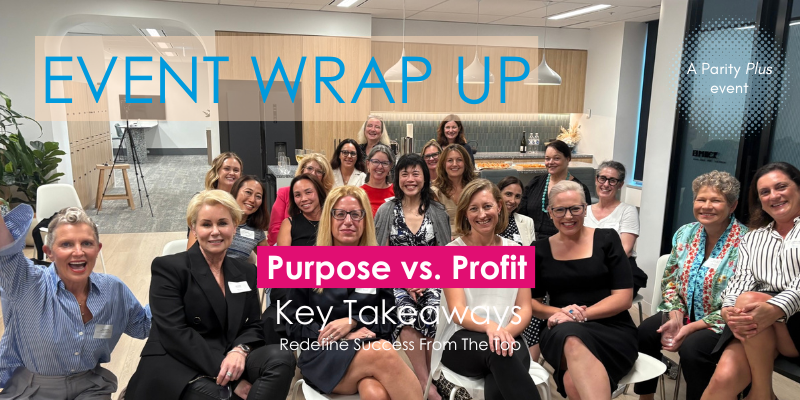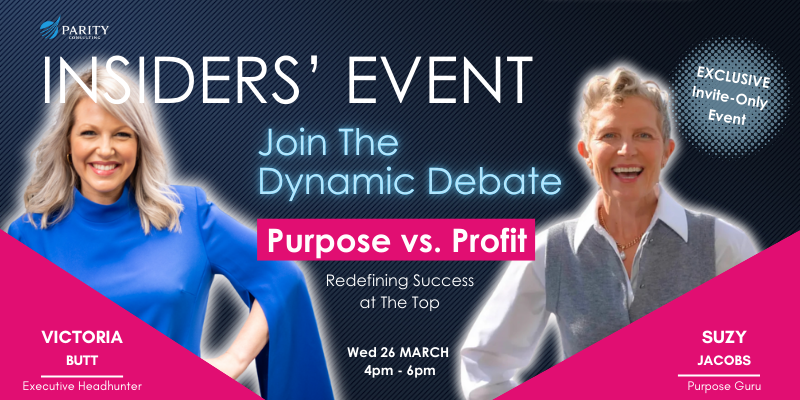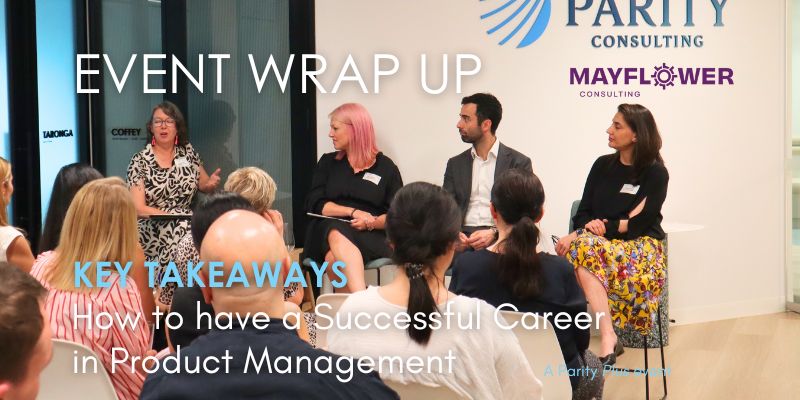
24th October, 2024
Parity Consulting was proud to present an incredible leadership event as part of our ParityPlus value-add initiative—Inspiring Emerging Board Directors.
This evening shed light on the nuanced journey to board roles, the challenges of leadership in a governance context, and the importance of resilience, patience, and strategic thinking in this career transition.
Key Takeaways

Victoria Butt, CEO Parity Consulting, Nicolette Rubinsztein, Non-Executive Director, Richard Brandweiner, Non-Executive Director, John Wilson, Non-Executive Director
1. Transitioning to a Board Career
External Triggers and Long-Term Planning:
Often, the move from executive roles to board positions is catalysed by external circumstances, such as organisational changes or leadership shifts.
A planned exit may take years to materialise, requiring persistence, networking, and an understanding that the path to a successful board career is often long and uncertain.
Advice for Transitioning:
Staying engaged in the industry during the transition is crucial. This could mean taking unpaid board roles in areas of interest or using the downtime to launch personal projects.
It’s important not to jump at every opportunity, but to remain selective and patient for the right board roles to appear.
Building a Network for Board Roles:
Many board positions are secured through personal networks rather than recruitment firms. Maintaining relationships with industry contacts is essential, as board opportunities tend to come in waves, with long periods of quiet followed by several offers at once.
TOP TIP
While your background and experience are valuable, it's trusted relationships that often make the difference.
Board roles are often secured through personal connections, where the trust factor plays a pivotal role. Building and maintaining strong relationships in your industry can open doors that qualifications alone may not.
Trust is key.
2. Balancing Executive and Board Roles
Strategic Board Engagement While Employed
Engaging in board or advisory roles while still holding executive positions offers valuable experience in governance and management without the pressure of leaving full-time work.
This approach can broaden one’s skills and relevance in executive roles while preparing for a future board career.
Broadened Skill Sets
Non-profit or industry-specific board roles are excellent opportunities for executives to deepen their governance experience.
These roles not only contribute to personal growth but can also enhance the value brought to an executive role by offering fresh perspectives on governance and leadership.
TOP TIP
While in your Executive role, utilise some of your annual leave time to gain Board experience. Be transparent with what you are doing with your organisation.
3. Defining a Board Style
Choosing the Right Board Profile
Directors can shape their career by focusing on a mix of public, private, and not-for-profit boards. Depending on personal interests, some directors are drawn to commercial businesses, where governance and shareholder value creation are the key drivers.
Others prefer to engage more directly with smaller, private companies, where they can have a more hands-on role.
A clear understanding of your personal strengths and the type of governance one enjoys is essential for shaping a successful portfolio career.
TOP TIP
Commit for the Long Haul.
Board roles come with a long-term commitment. Unlike executive roles, stepping down from a board—especially a public one—requires careful strategy, as it can impact shareholder confidence. Plan your exit wisely.

4. Challenges of Board Chairmanship
Varied Dynamics Across Boards
Chairing different types of boards – from well-established, well-governed organisations to mission-driven or member-appointed boards – requires a flexible leadership style. Each board’s composition, governance model, and the nature of the organisation’s purpose can create vastly different challenges. Chairs must navigate these dynamics with care, particularly when board members have differing levels of expertise or interest in the industry.
Dealing with Friction on Board
It is much more difficult to remove a board member compared to an executive, so it’s critical to be sure of the long-term fit when joining a board. Even subtle friction can make a board role challenging, especially when dynamics clash over time.
5. Adversity & Resilience in Board Roles
Handling Unexpected Exits
Exiting a board role, particularly in private companies with complex investor relations, can happen unexpectedly. Directors must be considered when aligning themselves with private equity-driven businesses, where the risk of being removed can be higher.
It’s important to thoroughly vet the governance structure and investor expectations before committing to such roles.
Navigating Personal Relationships in Board Interviews
Board selection is often influenced by personal relationships. While governance experience and industry expertise are critical, the interpersonal dynamics and trust factor between board members play a significant role in the selection process.
Directors must cultivate strong relationships within their industry, as these connections are often key to securing board positions.
Managing Rejection and Risk
Rejection is part of the process when pursuing board roles, and sometimes not getting a role can be a blessing in disguise. Due diligence can only reveal so much; sometimes the true challenges within a company emerge after a director is already seated.
Being selective about board roles, particularly in public companies, is crucial to maintaining one’s professional reputation.

6. Strategic Direction and Sustainability
Aligning with Impact and Values
Directors who are aligned with sustainable and impactful organisations often find themselves naturally drawn to roles that reflect their values. While it may not always be a strategic career move, directors often gravitate towards roles where their personal values are reflected in the company’s mission.
This alignment not only benefits the organisation but allows directors to contribute in ways that feel personally fulfilling.
Avoiding Pigeonholing
While directors may find themselves aligned with specific sectors or causes, it's important not to become overly specialised to the point of being pigeonholed.
Diversifying board roles across different industries and company types can ensure a well-rounded and resilient portfolio career.
TOP TIP
If a Board career is your goal, you have to work your pipeline. Relationships are key, so nurturing your network to uncover opportunities.
Be deliberate and keep connected. Think coffee meetings, and staying visible in places where your networks are.
7. Commercial Realities of Board Roles
Romanticising Board Roles
With board role applications on the rise, it’s easy to romanticise the concept of being a director. However, the reality is that board roles are often less about day-to-day execution and more about governance, strategic thinking, and risk management.
Those who thrive in board roles tend to be those who enjoy intellectual debate and navigating complex governance structures, rather than those who seek the fast-paced, hands-on style of management.
Brand and Risk Management
As directors become more experienced, protecting their personal brand becomes increasingly important.
Public board roles, in particular, come with heightened scrutiny, and directors must be diligent about aligning themselves with organisations that match their values and have strong governance practices.
TOP TIP
Early in your Board career, avoid the temptation to step into management mode and becoming hands on.
8. Compensation of Board Directors
It Varies
This can vary greatly depending on the type of organisation you are working with. It can range from no to low fees, to generous ones with long-term incentives (LTI).
As you gain more experience, you can establish your terms and negotiate accordingly.
Panellists:
Many thanks to our fabulous panel for their generously shared insights and experience and guidance.
Nicolette Rubinsztein, Non-Executive Director
Richard Brandweiner, Non-Executive Director
John Wilson, Non-Executive Director
What We Do
Business leaders need top-tier talentto exceed expectations and drive growth. At Parity, we swiftly attract and mobilisethe best candidates across Financial Services and Tech, ensuring they align with your culture, performance, and reputation.
With years of earned trust, Parity specialises in unearthing those perfect truffles—candidates in Product, Transformation, Marketing, Communications, Digital, and Data, who will elevate your organisation while ensuring quality always trumps quantity.
Our equitable and transparent placement process is trusted by clients and candidates alike.
See how the Parity team can help your organisation succeed—Download our Capability Statement here!



